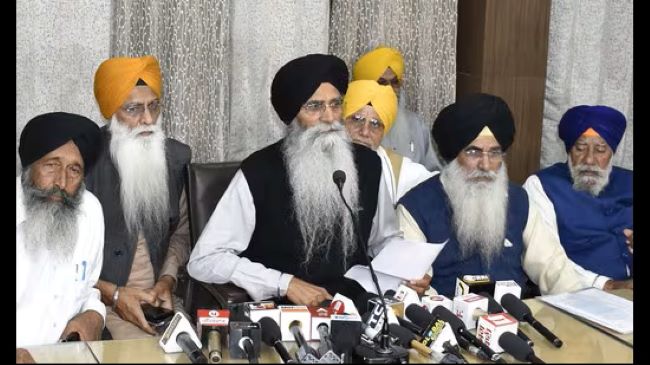 The recent incident at the Red Fort, where Amritdhari Gursikh Sarpanch Gurdhyan Singh of a village near Nabha was denied entry despite a special invitation due to his kirpan, has sparked widespread outrage. Shiromani Gurdwara Parbandhak Committee (SGPC) President Advocate Harjinder Singh Dhami condemned the act as an expression of anti-Sikh mentality. He called it a stark reminder that, even decades after independence, Sikhs continue to face discrimination in their own country, a nation for which they have sacrificed so much.
The recent incident at the Red Fort, where Amritdhari Gursikh Sarpanch Gurdhyan Singh of a village near Nabha was denied entry despite a special invitation due to his kirpan, has sparked widespread outrage. Shiromani Gurdwara Parbandhak Committee (SGPC) President Advocate Harjinder Singh Dhami condemned the act as an expression of anti-Sikh mentality. He called it a stark reminder that, even decades after independence, Sikhs continue to face discrimination in their own country, a nation for which they have sacrificed so much.
Sikhs have a long and proud history of defending justice and freedom. During the Mughal period, Guru Tegh Bahadur Ji sacrificed his life to protect the right of Hindus to practice their faith, establishing the principle that liberty of conscience is non-negotiable. Guru Gobind Singh Ji founded the Khalsa in 1699, giving Sikhs the five articles of faith – Kesh, Kangha, Kara, Kachera, and Kirpan – that define their identity and uphold the values of courage, equality, and righteousness. The kirpan, far from being a weapon, symbolizes a Sikh’s duty to fight oppression and protect the weak.
The sacrifices of Sikhs continued during the struggle against British colonial rule. From Baba Banda Singh Bahadur’s military campaigns to the heroic role of Sikh soldiers in both World Wars, Sikhs have consistently defended the nation and its ideals. During India’s partition, the Sikh community bore unspeakable losses while helping to protect vulnerable populations and maintain peace in turbulent times. Post-independence, Sikhs have contributed to India’s defense, governance, and social development, yet they have often faced alienation and prejudice.
Advocate Dhami rightly pointed out that preventing Gurdhyan Singh from entering the Red Fort because of his kirpan is not just an administrative oversight—it is an attack on the Sikh identity itself. If Amritdhari Sikhs cannot freely practice their faith in their own country, where they fought and sacrificed for freedom, how can they expect to live with dignity and respect in foreign lands, where religious minorities already face challenges and discrimination? This incident raises urgent questions about the protection of constitutional rights guaranteed under Article 25, which ensures freedom of religion, and about the nation’s commitment to pluralism.
The SGPC President emphasized that Independence Day celebrations lose their meaning if the citizens of the nation are barred from honoring their faith. The five articles of faith, especially the kirpan, are inseparable from Sikh identity. Denying their practice is tantamount to asking Sikhs to abandon their core values. This is not merely a legal issue but a moral one—India’s strength lies in respecting its diversity and protecting the rights of every community.
Advocate Dhami demanded strict action against the officials responsible for this disrespectful act and urged the government to ensure that such discrimination never happens again. Sikhs have always stood with the nation in times of crisis, but the nation must reciprocate with respect and recognition of their faith. Until Sikhs are allowed to live freely in accordance with their religious principles, celebrations of independence remain incomplete and hollow, and the very ideals for which countless Sikhs have laid down their lives remain unfulfilled.
This incident serves as a reminder that religious freedom is not a privilege—it is a right, and a nation that honors its heroes must also honor their beliefs. Amritdhari Sikhs, as defenders of faith and justice, deserve recognition, respect, and the ability to practice their traditions without fear of discrimination, both at home and abroad.